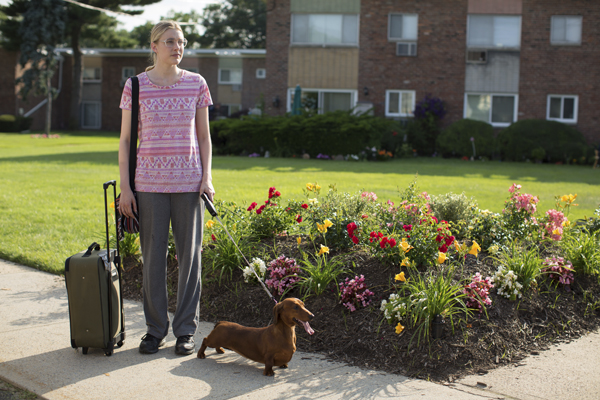There’s a moment in Todd Solondz’s newest film when some hitchhiking mariachis say they find America to be a harsher place compared to Mexico, and that observation seems to be the movie’s theme. Though having so much opportunity, not many of his characters here achieve happiness. It’s as if happiness doesn’t exist, or rather, it does, but there are barriers that prevent the ensemble from being happy. Parents lie to their children because it’s easier than telling them the truth, siblings lie to each other so no one’s feelings get hurt, agents tell their clients only what they want to hear, and an elderly woman, even though she has had success, looks back and sees all the mistakes that have left her ostracized from her family.
If you haven’t experienced a Solondz film yet, then brace yourself. You are in for some heady cynicism.
Wiener-Dog is a series of four roughly 20-minute short films, connected by the presence of the titular canine. It is unclear whether this is supposed to be the same dachshund in each story, drifting into the lives of different people. (The dog goes by different names in each segment.) Solondz doesn’t fall back on that kind of plot explanation. Instead, each main character having a pet dog is the thread that connects these tales about the different stages of life: childhood, young adulthood, middle age, and, finally, old age.
In the first story, Keaton Nigel Cooke plays a young boy whose father (Tracy Letts) buys him a dog with the intention of teaching him responsibility. His mother, played by Julie Delpy, disapproves, because the boy is a cancer survivor and she doesn’t think he is ready for that kind of undertaking. While the boy bonds with the dog, the father finds himself the sole person taking care of it, and the pet ends up being kept in a cage most of the time. Instead of the dog teaching him the lesson of responsibility, the boy learns the stark reality of having one’s freedom taken away.
The next segment catches up with two characters from 1996’s Welcome to the Dollhouse. Fans of that film will be treated to knowing what became of Dawn Wiener (played this time by Greta Gerwig) and Brandon McCarthy (Kieran Culkin). At a convenience store, Dawn bumps into grown-up Brandon, with whom she had a short romance in high school. Dawn and Brandon go on a road trip to Ohio, the purpose of which Brandon does not make clear to Dawn. Still holding onto her crush for him, she joins him on the trip, wiener dog in tow.
Culkin is on a recent streak, and somehow, by brute natural ability, he fills the screen with coolness. He steals the show just as he did in Scott Pilgrim vs. the World. He’s quickly becoming his generation’s Joaquin Phoenix.
Danny DeVito has perhaps his best dramatic role in more than a decade. He plays Dave Schmerz, a wiener dog owning film professor who’s only had one film produced. He has since fallen back on the life of an academic, only to be the butt of his students’ jokes. After getting the runaround from his agent, a bad report from his doctor, and a note from his department head that students find him too negative, he faces a crisis in his career and life. Has he become a fossil of a bygone era of filmmaking, or does he still have what it takes to make a great film?
Rounding out the film is Ellen Burstyn as a woman in her twilight years with no one to keep her company but her nurse and her dog. Not unlike her recent turn on House of Cards, Burstyn turns in a pitch-perfect performance as a cranky yet sharp, elderly woman. Zosia Mamet (Girls), as her granddaughter, shows up with her new boyfriend (Michael Shaw), an over-the-top caricature of a modern artist who calls himself Fantasy.
Todd Solondz made two important independent films of the 1990s, the one-two punch of the incredibly low budget Welcome to the Dollhouse, followed by the disturbing Happiness. The latter was a movie everyone was talking about, regardless of whether they had actually seen it. Solondz was a hit, even becoming somewhat of a regular guest on Late Night with Conan O’Brien (who had a deliciously fun cameo in 2001’s Storytelling). Solondz became pegged as this quirky nerd from New Jersey with an antisocial worldview. The problem was that after Happiness, he did not pull off a hat trick.
Solondz’s canon… What’s going on with it? It’s like his only shtick is creating deplorable characters. Although there was a lot more buzz behind Wiener-Dog than for his last several films, it’s another in a series of letdowns. With Solondz, his films feel the same: a stark view of American life, entirely populated with one-note characters.
As with all of Solondz’s films, you might laugh a couple times at the mockery of fairly common people. You’re going to be little outraged when an overly protective bourgie mother tells her son that a dog she codified with a Muslim name raped every animal in her childhood neighborhood. You’re going laugh when a woman describes her boyfriend’s art as “very controversial,” as if that inherently makes it good or at what college students say about their professor because youth is glorified over age and wisdom. If you laugh at these moments, then you are on game. The experience of watching a Todd Solondz film is it engages you to make these judgments.
In other words, Wiener-Dog is another cynical trip through Solondz-land. Enjoy!

















Leave A Comment